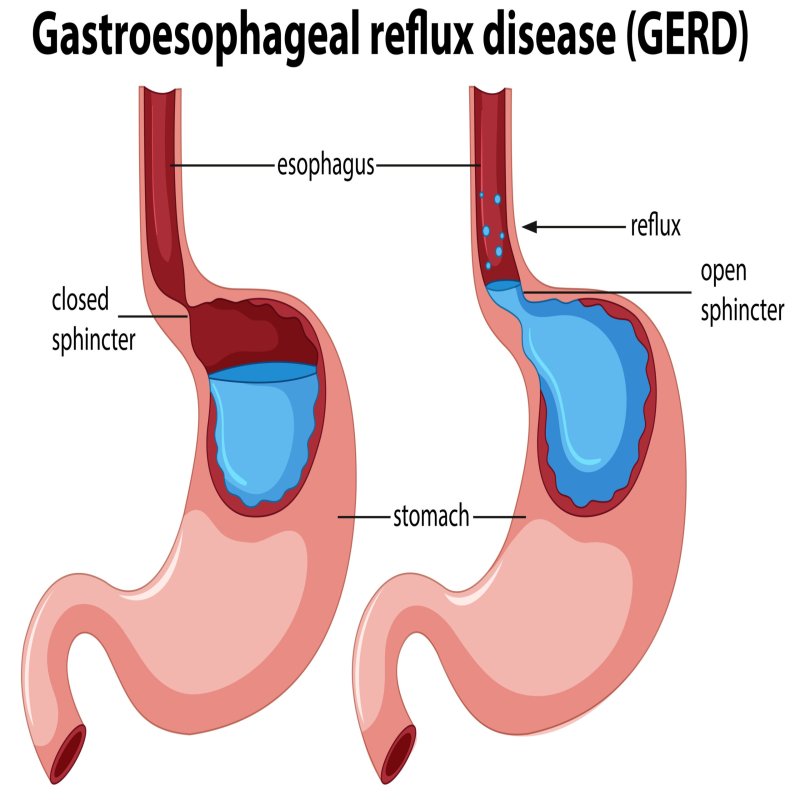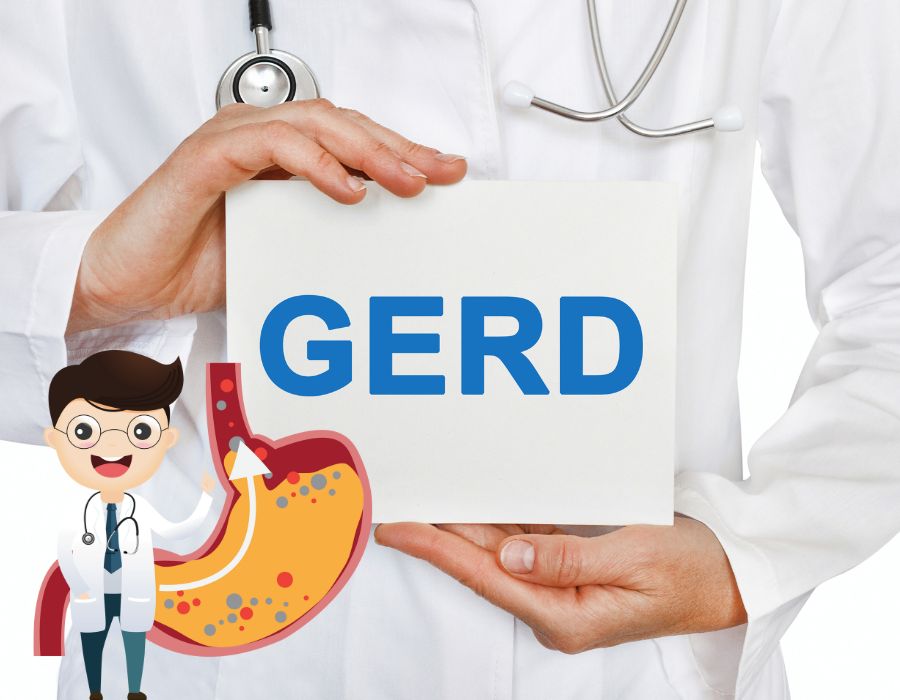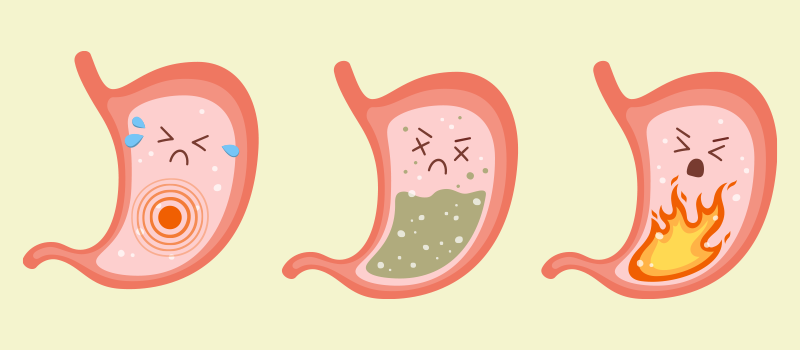
If you feel a burning sensation in your chest frequently while eating your food, and it feels even more painful when you try to lie down after eating, chances are you have Gastroesophageal Reflux Disease (GERD). It is a condition in which the stomach acid (gastric juices) flows back (refluxes) into the esophagus. When food enters your stomach, the lower esophageal sphincter (a valve at the end of your esophagus) fails to close completely. After that, acid travels up your esophagus and into your mouth and throat, giving you a sour taste.

It's completely normal to experience acid reflux and heartburn occasionally. But if you experience acid reflux or heartburn more than twice per week over several weeks, regularly use antacids and heartburn medications, and still experience symptoms, something is wrong. Functional medicine helps you pinpoint what's truly wrong and helps remove it.
Check for these Signs and Symptoms
Different people have different symptoms, but the common ones are:
- Heartburn
- Chest pain
- Coughing
- Vomiting
- Problem swallowing
- Anxiety or depression
- Hoarseness
- Sore throat
Children and infants go through the same symptoms, along with:
- Minor vomiting episodes
- Excessive crying
- Not wanting to eat (in babies and infants)
- Bad breath
- Difficulty sleeping post-eating etc.
Low levels of acid (hypochloridria) in the stomach are the primary cause of acid reflux. Low acid levels are activated by magnesium deficiency, high stress levels, hypothyroidism, smoking, drinking, and poor eating habits (not chewing food properly, eating too fast or too slow, not eating on time, etc.; eating processed meals; and consuming too much caffeine). It can also be provoked by an H. pylori infection, which means there is an overgrowth of bad bacteria in the gut.

Is GERD Dangerous or Life-Threatening?
GERD is generally not life-threatening, but if not taken seriously in the long term, it can lead to some serious health problems, including:
- Esophageal Cancer: Two primary forms of cancer start in the esophagus. The lower portion of the esophagus is where adenocarcinoma (a type of cancer that develops in the glands lining our organs) typically occurs. Another type of cancer that can happen is squamous cell carcinoma. Squamous cells are flat, thin cells on the surface of the esophagus. This kind of cancer is primarily noticed in the upper and middle portions of the esophagus. Squamous cell carcinoma is more prevalent than adenocarcinoma.
- Esophagitis: Esophagitis is caused when the esophageal lining is irritated and has inflammation brought on by stomach acid. Esophagitis can result in esophageal ulcers, heartburn, chest pain, bleeding, and swallowing difficulties.
Functional Medicine and GERD
The functional medicine method is a safe and efficient therapy for acid reflux. A physician who practices integrated functional medicine can examine the symptoms of your illness throughout the entire body, not just your gastrointestinal tract. Addressing the various imbalances in the whole body can help people regain better control over their symptoms, increase their daily energy levels, and enhance their general health.
For irregular and infrequent symptoms of reflux, over-the-counter antacids work well, but when used too regularly, they can worsen the issue. Since they pass through the stomach quickly, your stomach may start producing more acid as a result, which will again make your health imbalanced. A total overhaul of the body is required to be done by functional medicine experts so that we can move from mere relief to truly good health.

A wide range of therapies, including dietary changes, are included in the functional medicine treatment approach. The following are some examples:
- The Elimination Diet: The elimination diet is a kind of diet; that eliminates certain meal items that the patient might have an intolerance to. They are later reintroduced after a few days to see exactly which foods are causing problems and to what extent. This diet aims to discover whether specific foods increase or contribute to your symptoms. Diets may also remove these symptoms if this is the case. You may experience worse GERD symptoms if you consume certain foods and beverages. However, readers should know that the elimination diet isn't recommended to everyone, specifically not for people with compromised immune systems.
- A Diet That Doesn't Cause Inflammation: The Mediterranean diet, commonly referred to as the anti-inflammatory diet, consists primarily of whole foods from plants, plus many premium animal products. This kind of diet reduces or replaces inflammatory foods while increasing the intake of anti-inflammatory foods.
- A Cardiometabolic Eating Regimen: The cardiometabolic food plan is a metabolically balanced, phytonutrient-rich (antioxidants that help prevent cell damage, thus reducing chances of cancer) approach that aids in the body's control of inflammation, insulin levels, and metabolism. Because it addresses cardiovascular (heart-related) and metabolic illnesses, the eating plan is called “cardiometabolic.” This meal plan can treat all the reasons for inflammation, insulin resistance, and stress.
- A Diet With a Low Glycemic Index: The glycemic index (GI) is a scale that checks how certain foods affect an individual's blood sugar levels.
- A low-GI diet may help one lose weight, lower blood sugar levels, and minimize the chance of developing type-2 diabetes and heart disease, according to studies.
- Low-FODMAP Diet: FODMAPs are carbohydrates (sugars) that the small intestine has difficulty digesting. The full name of FODMAPs is “Fermentable Oligosaccharides Disaccharides Monosaccharides Polyols.” Saccharine is another word for sugar or sweet. There are three elimination stages in a low-FODMAP diet: You initially stop eating certain foods that are high in FODMAP. After that, you reintroduce them gradually to see which ones are problematic. Once you know the foods that make you feel bad, you can limit or avoid them while still enjoying all other foods guilt-free.
- Introduction of Nutraceuticals: Our bodies need at least 30 vitamins and numerous minerals to remain in top shape. Because our bodies cannot produce them in large quantities on their own, we must obtain them from outside sources. They keep our bodies functioning well primarily by converting food into energy, helping to strengthen our bones and our immune system, and also helping to heal injuries. Experts guide you on how to do it properly. Too much or too little vitamins and minerals are not good for our health.
Then, there are fatty acids that need to be introduced to take care of our hormone levels, the central nervous system, and the immune system. The body can generate non-essential fatty acids on its own, but it can't generate essential fatty acids, and we can get them only from food sources or supplements (you must have heard of Omega-3 fatty acids, which an essential fatty acids). “Nutraceuticals” comes from the words “nutrition” and “pharmaceuticals.” It is another name for nutritional products that can also be used as medicine. - Lifestyle Interventions: Avoid fatty foods. You should spread your meals throughout the day and choose low-fat foods. Additionally, make sure neither carbohydrates nor fats are abundant in your meals. You can also consult a functional medicine expert to find the best diet strategy. Enhancing sleep, going for personalized exercises, and learning stress management techniques can also help with lifestyle intervention.
Conclusion
Functional medicine doesn't just give you temporary relief; it focuses on the permanent removal of the issues if possible. A Functional medicine expert checks everything from your gut health to your mitochondrial health and other organs' conditions, whether your body can produce hormones and enzymes properly, etc.
Functional medicine promotes lifetime health by re-establishing harmony and balance within the body. Those who believe they have exhausted all therapeutic options for their acid reflux issues can consider integrated functional medicine.


.png)


